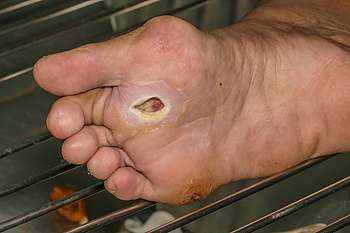March 2020
Symptoms of Neuropathy
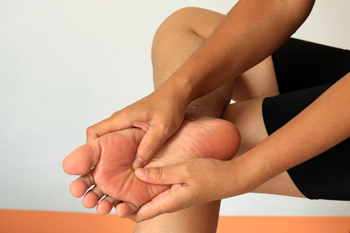 Many diabetic patients have been prone to experience a foot condition known as neuropathy. This condition may develop when the peripheral nerves become damaged. When these nerves become compressed, it’s likely that those affected will experience a certain degree of pain and discomfort. Common symptoms of neuropathy can include a numbing or tingling sensation, muscle cramping, difficulty with balance, or loss of feeling in the affected area. To help treat this condition, some patients have found relief with physical therapy and the use of assistive walking devices. For more information on neuropathy and how to treat this condition, it’s recommended that you speak with a podiatrist.
Many diabetic patients have been prone to experience a foot condition known as neuropathy. This condition may develop when the peripheral nerves become damaged. When these nerves become compressed, it’s likely that those affected will experience a certain degree of pain and discomfort. Common symptoms of neuropathy can include a numbing or tingling sensation, muscle cramping, difficulty with balance, or loss of feeling in the affected area. To help treat this condition, some patients have found relief with physical therapy and the use of assistive walking devices. For more information on neuropathy and how to treat this condition, it’s recommended that you speak with a podiatrist.
Neuropathy
Neuropathy can be a potentially serious condition, especially if it is left undiagnosed. If you have any concerns that you may be experiencing nerve loss in your feet, consult with Dr. John C. Lawlor from Florida. Our doctor will assess your condition and provide you with quality foot and ankle treatment for neuropathy.
What Is Neuropathy?
Neuropathy is a condition that leads to damage to the nerves in the body. Peripheral neuropathy, or neuropathy that affects your peripheral nervous system, usually occurs in the feet. Neuropathy can be triggered by a number of different causes. Such causes include diabetes, infections, cancers, disorders, and toxic substances.
Symptoms of Neuropathy Include:
- Numbness
- Sensation loss
- Prickling and tingling sensations
- Throbbing, freezing, burning pains
- Muscle weakness
Those with diabetes are at serious risk due to being unable to feel an ulcer on their feet. Diabetics usually also suffer from poor blood circulation. This can lead to the wound not healing, infections occurring, and the limb may have to be amputated.
Treatment
To treat neuropathy in the foot, podiatrists will first diagnose the cause of the neuropathy. Figuring out the underlying cause of the neuropathy will allow the podiatrist to prescribe the best treatment, whether it be caused by diabetes, toxic substance exposure, infection, etc. If the nerve has not died, then it’s possible that sensation may be able to return to the foot.
Pain medication may be issued for pain. Electrical nerve stimulation can be used to stimulate nerves. If the neuropathy is caused from pressure on the nerves, then surgery may be necessary.
If you have any questions, please feel free to contact one of our our offices located in Cape Coral and LaBelle, FL . We offer the newest diagnostic and treatment technologies for all your foot care needs.
Read more about NeuropathyReminder: When Was the Last Time...?
A Sprain Is a Common Form of Ankle Pain
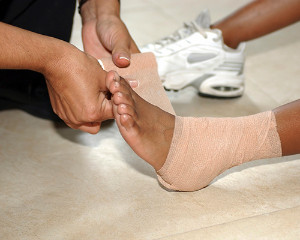 Research has indicated that ankle sprains account for approximately eighty-five percent of ankle pain. An ankle sprain is defined as tissues that become overstretched or torn, which may cause severe pain and discomfort. Sprains generally happen when the outside of the foot twists toward the ground, possibly as a result of suddenly stepping off of a curb. Typical symptoms of a sprain can include bruising, swelling, and difficulty walking. Patients may find mild relief when the affected foot is elevated, as well as when the ankle is wrapped in an elastic bandage. This may help to provide the support that is needed for recovery. If you have any type of ankle pain, it is suggested that you consult with a podiatrist as quickly as possible so a proper diagnosis can be determined.
Research has indicated that ankle sprains account for approximately eighty-five percent of ankle pain. An ankle sprain is defined as tissues that become overstretched or torn, which may cause severe pain and discomfort. Sprains generally happen when the outside of the foot twists toward the ground, possibly as a result of suddenly stepping off of a curb. Typical symptoms of a sprain can include bruising, swelling, and difficulty walking. Patients may find mild relief when the affected foot is elevated, as well as when the ankle is wrapped in an elastic bandage. This may help to provide the support that is needed for recovery. If you have any type of ankle pain, it is suggested that you consult with a podiatrist as quickly as possible so a proper diagnosis can be determined.
Ankle pain can be caused by a number of problems and may be potentially serious. If you have ankle pain, consult with Dr. John C. Lawlor from Florida. Our doctor will assess your condition and provide you with quality foot and ankle treatment.
Ankle pain is any condition that causes pain in the ankle. Due to the fact that the ankle consists of tendons, muscles, bones, and ligaments, ankle pain can come from a number of different conditions.
Causes
The most common causes of ankle pain include:
- Types of arthritis (rheumatoid, osteoarthritis, and gout)
- Ankle sprains
- Broken ankles
- Achilles tendinitis
- Achilles tendon rupture
- Stress fractures
- Bursitis
- Tarsal tunnel syndrome
- Plantar fasciitis
Symptoms
Symptoms of ankle injury vary based upon the condition. Pain may include general pain and discomfort, swelling, aching, redness, bruising, burning or stabbing sensations, and/or loss of sensation.
Diagnosis
Due to the wide variety of potential causes of ankle pain, podiatrists will utilize a number of different methods to properly diagnose ankle pain. This can include asking for personal and family medical histories and of any recent injuries. Further diagnosis may include sensation tests, a physical examination, and potentially x-rays or other imaging tests.
Treatment
Just as the range of causes varies widely, so do treatments. Some more common treatments are rest, ice packs, keeping pressure off the foot, orthotics and braces, medication for inflammation and pain, and surgery.
If you have any questions, please feel free to contact one of our our offices located in Cape Coral and LaBelle, FL . We offer the newest diagnostic and treatment technologies for all your foot care needs.
Read more about Ankle Pain
Common Signs of Athlete’s Foot
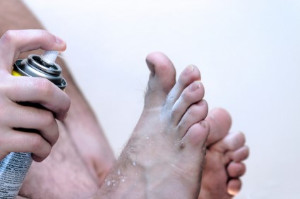 Common symptoms of an uncomfortable foot condition that is known as athlete’s foot can consist of a burning and itching sensation between the toes or on the bottom of the feet. In severe cases, blisters can develop and may become infected from intense scratching. This condition is caused by a fungus that is found in moist environments. These moist locations may include shower room floors, public pools, and surrounding areas. Additional symptoms may include foot odor, and the skin may become dry and cracked. The signs of athlete’s foot may lessen in a few weeks, but if it is recurring or will not heal, it is suggested that you speak to a podiatrist for proper treatment.
Common symptoms of an uncomfortable foot condition that is known as athlete’s foot can consist of a burning and itching sensation between the toes or on the bottom of the feet. In severe cases, blisters can develop and may become infected from intense scratching. This condition is caused by a fungus that is found in moist environments. These moist locations may include shower room floors, public pools, and surrounding areas. Additional symptoms may include foot odor, and the skin may become dry and cracked. The signs of athlete’s foot may lessen in a few weeks, but if it is recurring or will not heal, it is suggested that you speak to a podiatrist for proper treatment.
Athlete’s Foot
Athlete’s foot is often an uncomfortable condition to experience. Thankfully, podiatrists specialize in treating athlete’s foot and offer the best treatment options. If you have any questions about athlete’s foot, consult with Dr. John C. Lawlor from Florida. Our doctor will assess your condition and provide you with quality treatment.
What Is Athlete’s Foot?
Tinea pedis, more commonly known as athlete’s foot, is a non-serious and common fungal infection of the foot. Athlete’s foot is contagious and can be contracted by touching someone who has it or infected surfaces. The most common places contaminated by it are public showers, locker rooms, and swimming pools. Once contracted, it grows on feet that are left inside moist, dark, and warm shoes and socks.
Prevention
The most effective ways to prevent athlete’s foot include:
- Thoroughly washing and drying feet
- Avoid going barefoot in locker rooms and public showers
- Using shower shoes in public showers
- Wearing socks that allow the feet to breathe
- Changing socks and shoes frequently if you sweat a lot
Symptoms
Athlete’s foot initially occurs as a rash between the toes. However, if left undiagnosed, it can spread to the sides and bottom of the feet, toenails, and if touched by hand, the hands themselves. Symptoms include:
- Redness
- Burning
- Itching
- Scaly and peeling skin
Diagnosis and Treatment
Diagnosis is quick and easy. Skin samples will be taken and either viewed under a microscope or sent to a lab for testing. Sometimes, a podiatrist can diagnose it based on simply looking at it. Once confirmed, treatment options include oral and topical antifungal medications.
If you have any questions, please feel free to contact one of our our offices located in Cape Coral and LaBelle, FL . We offer the newest diagnostic and treatment technologies for all your foot care needs.
Read more about Athlete’s Foot
Signs You May Have Developed Gout
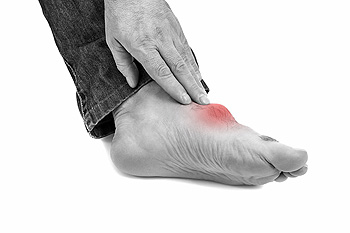 Gout is a type of inflammatory arthritis that occurs when too much uric acid is found in the blood. When this uric acid progressively builds up, crystals form that attach to the joints and lead to pain, often felt in the foot or ankle region. This pain may also come in spurts, which is typically referred to as gout attacks. Redness and swelling of the feet, along with pain, and feeling slightly feverish, are all symptoms you may experience if you have developed gout. Because this condition can be incredibly painful, it’s recommended that you seek the care of a podiatrist who will be able to properly diagnose your condition, as well as offer you a means to alleviate your discomfort.
Gout is a type of inflammatory arthritis that occurs when too much uric acid is found in the blood. When this uric acid progressively builds up, crystals form that attach to the joints and lead to pain, often felt in the foot or ankle region. This pain may also come in spurts, which is typically referred to as gout attacks. Redness and swelling of the feet, along with pain, and feeling slightly feverish, are all symptoms you may experience if you have developed gout. Because this condition can be incredibly painful, it’s recommended that you seek the care of a podiatrist who will be able to properly diagnose your condition, as well as offer you a means to alleviate your discomfort.
Gout is a painful condition that can be treated. If you are seeking treatment, contact Dr. John C. Lawlor from Florida. Our doctor will treat your foot and ankle needs.
What Is Gout?
Gout is a form of arthritis that is characterized by sudden, severe attacks of pain, redness, and tenderness in the joints. The condition usually affects the joint at the base of the big toe. A gout attack can occur at any random time, such as the middle of the night while you are asleep.
Symptoms
- Intense Joint Pain - Usually around the large joint of your big toe, and it most severe within the first four to twelve hours
- Lingering Discomfort - Joint discomfort may last from a few days to a few weeks
- Inflammation and Redness -Affected joints may become swollen, tender, warm and red
- Limited Range of Motion - May experience a decrease in joint mobility
Risk Factors
- Genetics - If family members have gout, you’re more likely to have it
- Medications - Diuretic medications can raise uric acid levels
- Gender/Age - Gout is more common in men until the age of 60. It is believed that estrogen protects women until that point
- Diet - Eating red meat and shellfish increases your risk
- Alcohol - Having more than two alcoholic drinks per day increases your risk
- Obesity - Obese people are at a higher risk for gout
Prior to visiting your podiatrist to receive treatment for gout, there are a few things you should do beforehand. If you have gout you should write down your symptoms--including when they started and how often you experience them, important medical information you may have, and any questions you may have. Writing down these three things will help your podiatrist in assessing your specific situation so that he or she may provide the best route of treatment for you.
If you have any questions, please feel free to contact one of our our offices located in Cape Coral and LaBelle, FL . We offer the newest diagnostic and treatment technologies for all your foot care needs.
Read more about GoutDiabetic Patients and Their Feet
The medical condition that is referred to as diabetes may affect the feet. This ailment can slow the healing process, and wounds on the feet can lead to further complications. Many diabetic patients experience neuropathy. Common symptoms of this can include a burning sensation, tingling, and it may be difficult to feel sensations in the feet. This can occur as a result of restricted blood flow, which may weaken the feet. Calluses can form in diabetic patients, which will become thick if not properly trimmed. This can possibly lead to foot ulcers, infection, gangrene, and possibly amputation. If you have diabetes, it is strongly advised that you are under the care of a podiatrist who can provide you with professional care and treatment.
Diabetic foot care is important in preventing foot ailments such as ulcers. If you are suffering from diabetes or have any other concerns about your feet, contact Dr. John C. Lawlor from Florida. Our doctor can provide the care you need to keep you pain-free and on your feet.
Diabetic Foot Care
Diabetes affects millions of people every year. The condition can damage blood vessels in many parts of the body, especially the feet. Because of this, taking care of your feet is essential if you have diabetes, and having a podiatrist help monitor your foot health is highly recommended.
The Importance of Caring for Your Feet
- Routinely inspect your feet for bruises or sores.
- Wear socks that fit your feet comfortably.
- Wear comfortable shoes that provide adequate support.
Patients with diabetes should have their doctor monitor their blood levels, as blood sugar levels play such a huge role in diabetic care. Monitoring these levels on a regular basis is highly advised.
It is always best to inform your healthcare professional of any concerns you may have regarding your feet, especially for diabetic patients. Early treatment and routine foot examinations are keys to maintaining proper health, especially because severe complications can arise if proper treatment is not applied.
If you have any questions please feel free to contact one of our our offices located in Cape Coral and LaBelle, FL . We offer the newest diagnostic and treatment technologies for all your foot and ankle needs.
Read more about Diabetic Foot Conditions





